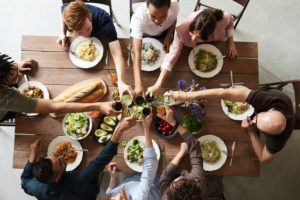Thanksgiving is just around the corner and we’re facing the prospect of a huge holiday meal. Soon, a great number of us will be sitting around tables loaded down with an abundance of delicious dishes. For those who are susceptible, the temptation to overeat could be overwhelming.
Not everyone overeats during the holidays but for those who have a problem with food and weight, it can be a challenging time. Whenever a holiday approaches, those susceptible individuals start to get stressed. Instead of looking forward to the festivities, over-eaters have come to dread them.
This points us to the question: Why do people overeat during the holidays? There are several reasons. First of all, holidays act like emotional magnifiers, increasing both our positive and negative feelings. For someone who’s prone to emotional stress, the holiday season amplifies that stress.
We should understand that over-eaters are using food in an attempt to cope with uncomfortable emotions, so when they feel stress, they’re more likely to overeat. An over-eater might have been doing well for a while, but an upcoming holiday can upset the balance and send this person into a tailspin.
People can overeat more during the holidays because they’re spending a concentrated period of time with their family of origin. If you’re an over-eater, it’s very often due to the way you were raised. Hurts or losses from childhood can cause emotional wounds which you unconsciously seek to heal or soothe through overindulging in food.
Spending time with those individuals who were responsible for your emotional wounds can cause you distress – the kind that gets you reaching for second and third helpings of holiday foods.
Emotional trauma gets reactivated when a person is reminded of the original circumstances that surrounded it. If you experienced any hurts or losses in your childhood, being around your family of origin is likely to trigger you – at least on an unconscious level – which can then activate your habitual coping strategies. If you’ve had issues with overeating, you’re most likely to turn to food.
Another reason why people overeat at Thanksgiving is that being around their family of origin tends to make a person regress back to the child they once were. You can find yourself falling into the same petty squabbles with your siblings and having the same frustrating conversations with your parents or relatives that you had when you were a kid.
Regression means that the inner child is at the forefront. This is the impulsive, irrational part of your psyche that seeks pleasure or soothing without considering the consequences. It’s easy to let yourself go when the inner child is driving your choices.
When the table is loaded with an abundance of delights your inner child has difficulty with self-control. And even if you never experienced trauma as a child, any aggravation or frustration you’re feeling around your family of origin could send the child to seek comfort through food. Either way, regression equals overindulging.
Another reason for eating too much during the holidays is loneliness. If you’re the only single person in your family, being surrounded by all your married siblings and cousins can make you feel even more alone. If you’ve had issues with overeating in the past, this situation might make you want to overeat even more.
Food is our first source of deep soothing and nurturing. Every infant can be calmed down by giving them a hug and a bottle or their mother’s breast. That’s why even people who aren’t habitual over-eaters are likely turn to food when under stress.
Families can be challenging. Maybe one of your relatives is a braggart or one is a bully; maybe one’s a mean drunk or one is your political opposite and always ready to argue. Even if you’ve had no trauma; even if you don’t regress, the stress of sitting around the table with these difficult people could still make you want to overeat.
No matter what triggers you to overindulge during the holidays, you should know that it’s not inevitable. You can make better choices.
As Thanksgiving approaches, you can stop and think about the triggers that arose for you at previous holiday celebrations. You can choose to take better care of yourself this year.
You can try to sit as far away from the difficult relatives as possible; you can avoid conversations that might upset you and you can even make a plan to periodically take time-outs to be by yourself and just breathe.
You can decide to take one serving of the foods you like and then just stop eating.
You can always step away from the table to calm yourself if things are getting stressful. Most importantly, you can remember that stuffing yourself with more food isn’t going to make you feel better. Real emotional self-care is the only way to go.
Thanksgiving is around the corner and not everyone is looking forward to it. Spending the holidays with your family might be a trigger for overindulging that you’ve come to dread.
Remember that you have options other than just letting yourself go. When you take responsibility for your emotional well-being over the holidays, you’ll be calmer, happier and a lot less likely to overeat.
Sign up here for my free biweekly wellness newsletter that brings you fresh, thought-provoking content.
Subscribe to my YouTube Channel to watch my series Moving into Autumn with Good Self-Care, where you’ll learn simple tips for taking the best care of yourself and your loved ones this fall season.
Tune in to my Ruthless Compassion Podcast where I go in-depth about topics like mental health, trauma, and loneliness.



